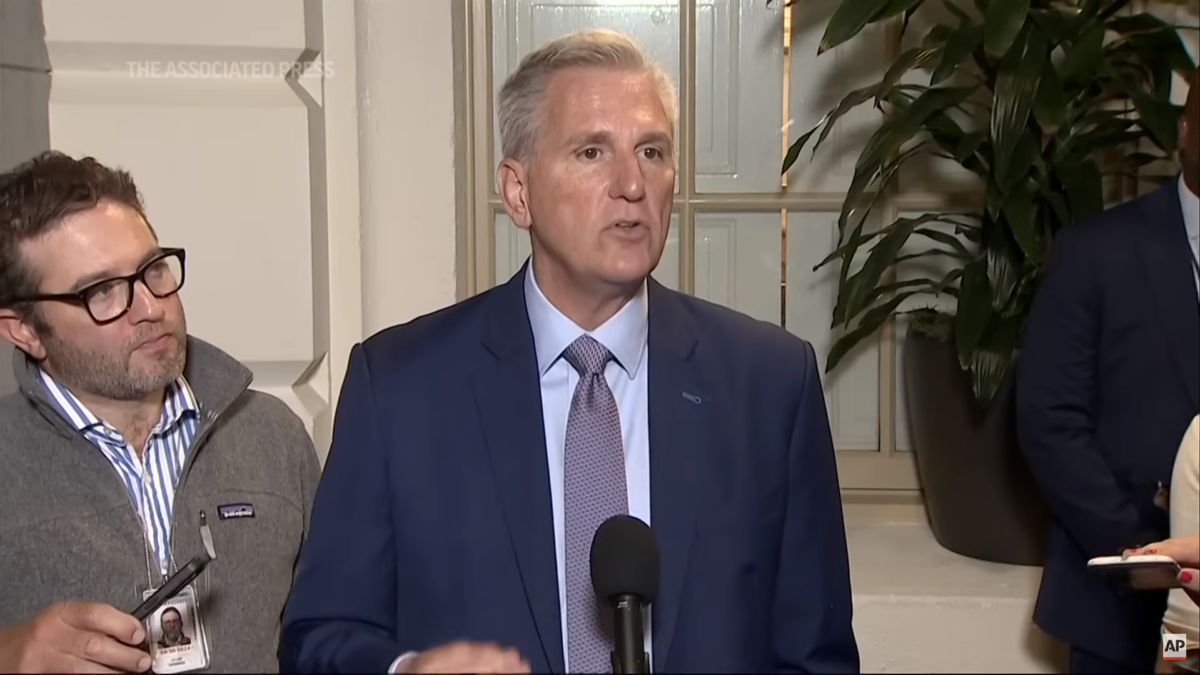
Did you see that the federal government spent $356,000 to see how cocaine affects the sexual promiscuity of quails? Seriously. And it’s just a drop in the bucket of spending that Democrats and Republicans continue to make ever bigger.
Overspending is playing second fiddle to circus-like partisanship related to the U.S. Supreme Court, next month’s elections, and more. As Manhattan Institute Senior Fellow Brian Riedl reported over the summer:
Here is the portrait of a dysfunctional party: On Tuesday, the House Republicans unveiled a budget that set a goal of spending cuts totaling $6,454 billion. On Wednesday, Senate Republicans defeated legislation to cut spending by $1 billion. On Thursday, House Republicans voted to renew $20 billion per year in farm subsidies.
The 2018 GOP talks like Barry Goldwater and spends like Lyndon Johnson.
Riedl’s piece is worth reading in full. The same party that spent a decade promising to balance the budget couldn’t cut $1 billion from a budget of $4 trillion. That comes after a tax law and constant omnibus bills that increase the national debt. Congress is expected to approve yet another omnibus bill by the end of the year.
The Congressional Budget Office (CBO) noted in a report this year that the bankruptcy of America is mostly driven by spending on “Social Security, the major health care programs (primarily Medicare), and interest on the government’s debt.” Republicans spent a decade promising to reform both programs. Now, they’re acting like Democrats and ignoring their responsibilities to present and future generations.
Things are so bad that President Trump, who proposed eliminating 62 programs earlier this year but promised to not touch Social Security and Medicare on the 2016 campaign trail, is merely asking for a 5 percent agency budget cut from his cabinet. Yet as I outlined at The Stream over the weekend, even this paltry goal is likely to fail.
Republicans Are Putting Your Financial Future At Risk
There are several key consequences of Republicans’ betrayal on the spending and the debt. First, as reported in the most recent assessment of Social Security’s and Medicare’s financial health, both programs will need either major benefit cuts or increased taxes in order to pay for retirees. To quote the programs’ trustees:
Lawmakers have many policy options that would reduce or eliminate the long-term financing shortfalls in Social Security and Medicare. Lawmakers should address these financial challenges as soon as possible. Taking action sooner rather than later will permit consideration of a broader range of solutions and provide more time to phase in changes so that the public has adequate time to prepare.
In practical terms, Republicans control Washington. They refuse to make even modest changes to Social Security and Medicare because they are scared of what Democrats will say and do. Elections rule over duty. And if you think you’ll receive the full benefits relative to the taxes you’ve paid, you should change your expectations.
Second, the GOP-caused deficits will offset some of tax reform’s projected growth. High national debt significantly slows economic growth. The GOP has significantly increased projected deficits twice since Thanksgiving 2017, through the omnibus bill and the tax reform law.
To quote CBO, this fiscal profligacy will hurt workers, “because federal borrowing reduces total saving in the economy over time, the nation’s capital stock would ultimately be smaller, and productivity and total wages would be lower.”
President Trump threatened to veto the omnibus. Many conservatives urged Congress to cut spending as well as taxes. Those efforts towards fiscal responsibility were ignored. Workers will pay the price.
Finally, seen in the same CBO report, greater national debt means “the likelihood of a fiscal crisis in the United States would increase.”
There would be a greater risk that investors would become unwilling to finance the government’s borrowing unless they were compensated with very high interest rates; if that happened, interest rates on federal debt would rise suddenly and sharply.
This means that a true fiscal collapse is more likely to occur in the United States. The Washington Post explained in 2015 the impact of debt defaults on several nations in the recent past. Unemployment and inflation would likely rise, and incomes would likely drop. Ironically, in order to get out of a debt-driven default, the United States would likely have to take more loans or cut spending dramatically.
Spending cuts are very likely under a default. Sharply increased federal interest rates mean interest rates will take up even more of the federal budget. This means spending in other areas–such as defense, immigration enforcement, education, or Social Security–will go to interest payments.
Most Americans would be disappointed in a family that was irresponsible enough to default on its credit card debt rather than create a plan for debt reduction. Yet despite telling pollsters that we disapprove of our elected members of Congress, almost all of whom contribute to this state of affairs, we keep voting them back in.
Basic Oversight Helps
Options abound for cutting federal spending. Capitol Hill’s cowards–I mean, leaders–don’t need to even cut anything controversial to make at least some cuts. They can leave Medicare, Medicaid, corporate welfare, and defense spending alone, and still cut at least 10 percent of the budget in a bipartisan fashion.
They shouldn’t leave that spending alone. But they clearly won’t risk their careers to make mathematically necessary cuts. The parties could still reduce the shameful amount of money spent on fraud, abuse, waste, and duplication.
Improper payments totaled $145 billion in 2017. This conservative estimate is based upon 78 percent of federal spending. Errors of these kinds are likely far more wasteful than the official estimate. Yet the full Senate hasn’t considered two bipartisan bills meant to cut improper payments, including one that aims to reduce payments to dead people.
Fraud is rampant. The Pentagon and federal health care programs regularly see billions lost to simple theft. And those are just the easy targets.
Likewise, duplicated programs–in other words, programs that unnecessarily overlap responsibilities–have wasted hundreds of billions of dollars in the last few years. There is no exact estimate of how much is lost annually, but the Government Accountability Office’s most recent report found one change alone could save $40 billion.
That doesn’t account for obviously wasteful spending like that which Sen. James Lankford (R-OK) identifies in his annual “Federal Fumbles” report. For example, according to the 2017 report, “the NIH has funded a $1.2 million project to develop ‘comfortable collars’ with RFID tags for rhesus monkeys so that researchers can track their exact location within a half-acre living area.”
Waste is also found in the many federal projects that run overbudget due to incompetence, corruption, or simple human error. Lankford’s predecessor, retired senator Tom Coburn, estimated in 2012 that $700 billion in grant money was sitting unused.
Clearly, options abound for Republicans to hold to their promise to cut spending. Eliminating inefficiencies would still leave our government too big and too expensive. It won’t save us from an eventual fiscal collapse. However, we would have more breathing room to elect members of Congress willing to actually do their jobs.
As it stands, the party that ran on fiscally conservative values continues to show those who trusted it that they are more about good rhetoric than good policies. The rest of us will suffer for it.









